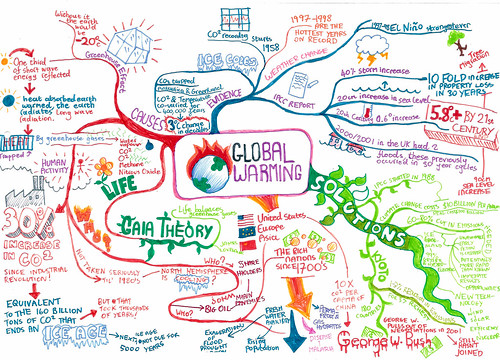I've just found more free geography podcasts here
(haven't listened to them so don't know how much of our syllabus they cover!)
Friday 8 May 2009
Thursday 19 March 2009
More podcasts
I've found this site http://lhs.typepad.co.uk/weblog/geography/ which has (free!) podcasts for several topics. It is for the Scottish syllabus but many of the issues covered will be the same.
Wednesday 11 March 2009
Exam skills especially for paper 1
This is a really useful page for advice on exam skills for our paper, including some downloadable quick advice sheets on mapwork, using photograph, using graphs etc (all paper 1 stuff!)
Friday 16 January 2009
Global warming
I found this mindmap about global warming on Flickr. Click on the image to see a bigger version or go to Flickr here to download it in various sizes. There is another mindmap below just about solving global warming. Both very useful!


Solving global warming
I found this mindmap on Flickr all about solving global warming. Click on the image to get a full size version or go to Flickr here where you can download the mindmap in various sizes.


Mapwork
Some hints for the mapwork you might encounter on paper 1. Thanks to Mr Cowan, Geography teacher in Stockton for this.
Wednesday 14 January 2009
Case study card
Here is the blank template you can use for your case studies. Remember - you can amend the subheadings if you need to, depending on your case study. You can download and print this by using the drop down menu that appears when you hover over the 'ipaper' logo at the top.
GCS Case Study Card
GCS Case Study Card
Case Studies
Here is the information you were given in class about the extra case studies homeworks.
Case Study Instructions Jan09
Case Study Instructions Jan09
Tuesday 6 January 2009
Podcasts

You can create your own podcasts or there are some available on the internet for some topics that people have created (make sure they are topics we study if you intend to use these!) There is a new site offering podcasts to buy (for all subjects, not just Geography). Have a look at www.gcsepod.co.uk/ . They seem very reasonably priced.
Sunday 2 November 2008
Geographical Dictionary
Click here for a Geographical Dictionary if there are any terms you don't understand.
Friday 16 May 2008
Pen colours on exam paper

It has come to my attention that you may only be allowed to write in BLACK ink on the exam paper this year. (It has certainly been the case for some other AQA exams). You might have been told this in school but as I haven't been there I don't know! You also need to make sure you only write on the lines (if you need extra space ask for extra sheets to write on). The reason for both these is that some AQA exam papers are marked by examiners via computer (so black shows up better!)
Sunday 27 April 2008
Paper 1 and other revision sites
For paper 1 have a look at this superb site from another Geography teacher: paper 1
Look at the links on the left hand site of this site too for revision for the other topics.
This site, by Geographty teacher Mr Lawson also has revision materials for every topic - another blog that is definately worth a look!
Look at the links on the left hand site of this site too for revision for the other topics.
This site, by Geographty teacher Mr Lawson also has revision materials for every topic - another blog that is definately worth a look!
Monday 18 February 2008
Revision notes and past questions

Well, not unless its this one or one I've posted a link to!!
If the powerpoints on the blog aren't working ignore the message saying the powerpoint has been removed or made private (slideshare is lying!!) Use the links given to view them directly on slideshare!
St Dunstan's in Somerset do the same course as us.
Click here for mindmaps of eack topic (click on the topics to view the notes) and here for past questions on each topic. Again, you'll need to click on the topic name to access the questions.
Thanks to the Head of the Geography Department at St Dinstan's for sharing these.
You can download the AQA C Geography syllabus from here . You want the subject content (page 18 onwards).
and past papers (and markschemes to self mark) are available from here.
To get your brain in gear why not try Mr Mothersole's quiz specifically for our syllabus - click here to access it at Wycombe High School site (thanks for letting us use this!)
Geographical skills

Alongside the information and practice papers for paper 1 (Skills and decision making) I've given you, you might want to check out the BBC Bitesize section on geographical skills.
Pressures at the rural-urban fringe in MEDCs

1. View the powerpoint as a starting point to revision of this topic. If you can't see it below click here to view it. (Thanks to Lisa Rabbetts, Geography teacher for this).
2. Several very useful sections on Rob Chambers' blog....
All about greenbelts – controlling urban sprawl (greenbelts and building on brownfield sites)
Land use and conflict at the rural-urban fringe
Out of town shopping centres
Counterurbanisation - causes and consequences.
Changing towns and cities

1. Look at the powerpoint below for an outline as to what you would expect to find in the CBD and why. If you can't see it below click here to view it.
2. Read about the Inner City here and about the CBD here. (Thanks Mr Chambers!)
3. What are urban issues in MEDCs? Find out from the BBC here and here
4. Redevelopment
The last link started to talk about redevelopment in the London Docklands but you'll need more information. The movie here will help too.
5. More about urban renewal and managing CBDs, including traffic management.
Labels:
case studies,
Changing towns and cities
Rural-urban migration in LEDCs
1. You can find an overview of urbanisation here and information about urban growth in LEDCs here.
2. This short movie shows you about the push and pull factors that result in the migration to the cities in Brazil and shows you some of the conditions in the favelas (shanty towns).
Follow this with urban problems in Sao Paulo (Brazil) and actions taken to improve the living conditions in Rio.
3. We also looked at Kibera, Nairobi, Kenya in class. Click here and scroll down to find the Nairobi BBC Bitesize clip then look here for the problems assoiated with living in a shanty town like Kibera.
Population change

1. Some background information first of all from the BBC and S-Cool (you don't need the section on population distribution).
2. For information on population structures and the demographic transition model see here and here (You don't need the 'you should be able to' points on this last link - this is for a different syllabus). Thanks to Richard Allaway from the International School in Toulouse, France for this last link.
Also have a look at the powerpoint below but if you can't view it click here to see it.
Click here and scroll down to see the BBC Bitesize clip on population pyramids.
3. The problems of an ageing population
Watch this short film , listen to this podcast and check out the links on the main Geography blog here
4. What can be done to reduce the birth rate in LEDCs?
In class we looked at two contrasting approaches in Kerala, India and China's One Child Policy.
There are links to several articles on the Geography blog here, including measures MEDCs are taking to try to encourage people to have more children (you need to know this too!)
Click here and scroll down to see the BBC Bitesize clips on population measures in China and Kerala.
More on Kerala and more about China's One Child Policy
Labels:
case studies,
podcast,
Population change
Pressures on the physical environment

We chose to look at a glaciated area (Lake District National Park) and a limestone area (the Peak District National Park). Other classes may have done a coastal area for a second case study instead.
1. For the Lake District and glaciation start with the Bitesize revision notes and S-Cool's section on glaciation (You don't need all the sections here but use your classwork notes as a guide to what you need to know)
2. Click here and scroll down to access the BBC Bitesize clip about Tourism in National Parks. Here are some notes on tourism in National Parks - a bit brief perhaps but a good starting point and a map to show the location of national parks is here
3. Limestone! Learn all about limestone here and here. This section from S-Cool is useful for a bit more information about weathering processes.
4. Two short films about tourism in the Peak District from other Geography teachers can be found here and here.
Food and water supply
1. A short video to show the causes of poor food supplies can be accessed here and watch the powerpoint below from Lisa Rabbetts (Geography teacher). If you can't see the powerpoint below click here to view it.
2. The revision notes on environmental hazards from S-Cool are helpful.
3. Drought and desertification in the Sahel should be one of your case studies. Click here for a short film and view the powerpoint below from Chesterton Community College. (If you can't see it below click here to go to slideshare to view it). This page has a really useful summary of the main issues.
4. You need to know what people have done to overcome water shortages. Go to this Oxfam page to make notes and also here and look at the case studies that show what water shortages mean to people around the world. Again, make notes if you haven't got some of this information in your class notes.
This Global Eye page is about water supply. Click on the link on the left of the page (The Marunda project).
2. The revision notes on environmental hazards from S-Cool are helpful.
3. Drought and desertification in the Sahel should be one of your case studies. Click here for a short film and view the powerpoint below from Chesterton Community College. (If you can't see it below click here to go to slideshare to view it). This page has a really useful summary of the main issues.
4. You need to know what people have done to overcome water shortages. Go to this Oxfam page to make notes and also here and look at the case studies that show what water shortages mean to people around the world. Again, make notes if you haven't got some of this information in your class notes.
This Global Eye page is about water supply. Click on the link on the left of the page (The Marunda project).
Labels:
case study,
Food and water supply
Weather hazards

Most of this section looks at the effects of, and management of floods and tropical storms (hurricanes, cyclones) in LEDCs and MEDCs.
1. This animated guide to hurricane formation is a good starting point. Go to this BBC webpage and click on the first short clip to show how a hurricane is formed.
2. Revision notes from S-Cool can be found here and there is more on tropical storms here and here.
3. A podcast on a cyclone hitting Bangladesh is here.
4. The video below from You Tube compares Hurricane Katrina (which hit MEDC) and Hurricane Mitch (which hit LEDCs). You would need more information for your case studies but the film will go with your (hopefully) completed case studies in class!
An excellent, in-depth look at Hurricane Katrina from the BBC.
Flooding
5. For information on the Bangladesh floods of 1998 see here from Mr Chambers. Bangledesh experiences flooding every year but the 1998 floods were particularly severe.
6. Mr Chamber's section on the Boscastle floods is here and the powerpoint below shows flooding in the north of England last summer (thanks to a Geography teacher in Cambridgeshire for this). If yo can't view the powerpoint below click here to view it.
Labels:
case studies,
podcast,
Weather hazards
Unstable plate margins

1. Mr Chambers, Head of Geography at St Ivo School, Cambridgeshire has several excellent sections that will help you: An introduction to plate tectonics can be found here.. For information on the different plate boundaries click here. Animations of the movement at the different plate boundaries is here.. A podcast about tectonics is here.
The BBC Bitesize section on plate tectonics is useful, as are the revision notes from S-Cool. (You don't need all the sections here).
A plate tectonics revision list, including games can be found here
2. Comparing the effects of earthquakes in MEDCs and LEDCs is here and look at this section on preparing for earthquakes .
3. You will need also causes and prediction of earthquakes and the prediction of volcanic activity.
4. Volcanoes: Where they are found and why is here
5. Case studies: Mount St Helens 1980 (volcanic eruption in MEDC) from Mr Chambers is here. If you like podcasts try this one.
Mt Pinatubo 1991 (volcanic eruption in LEDC): A 44 second film from You Tube shows some of the effects of this eruption on the surrounding area and on the USA's air base that was evacuated.
Further details on this eruption can be found here and here.
In class we did the eruptions on Montserrat - its fine to use this instead if you classwork notes are detailed enough!
You need examples of earthquakes in LEDCs and MEDCs.
Kobe, Japan, 1995 - this BBC page has some outline details and a link to a short film clip. There is a podcast here if you prefer listening to watching!
Kashmir (Pakistan) earthquake - A powerpoint from another Geography teacher: (Slideshare is playing up at the moment and doesn't like embedding powerpoints - no idea why! If the powerpoint doesn't show below click here to view it instead.)
and some more details (from yet another geographer!) here.
The Kashmir earthquake from You Tube
If you prefer the Bam earthquake in Iran try this.
If you want information on the San francisco earthquake of 1989 go here.
6. Finally (!) Animated guides to earthquakes and volcanoes from the BBC.
Labels:
case studies,
podcast,
Unstable plate margins
Sunday 17 February 2008
Tourism and the economy

1. BBC Bitesize on tourism can be found here
2. A podcast on tourism is available here
3. S-Cool has two useful sets of revision notes: The impacts of tourism and tourism in a LEDC and ecotourism (you'll need to scroll down to the relevant sections).
4. Sustainable tourism in Belize from Global Eye is here
5. Ecotourism
Click here to go to a powerpoint on ecotourism from another Geography teacher if you can't see the powerpoint below:
Labels:
case study,
podcast,
Tourism and the economy
Managing Economic Development

1. Chernobyl nuclear accident: Click here to watch a short movie about Chernobyl.
This is a Greenpeace video from You Tube about the Chernobyl accident:
2. Comprehensive information on the Bhopal industrial accident can be fround on the BBC website and there is some information on the main Geography department blog here.
3. Oil pollution - click here
4. Acid rain - an excellent case study from Mr Chambers (Geography teacher) can be found here
5. Global warming, acid rain and ozone depletion (very cheery!) from S-Cool can be found here
6. Global warming:
Click here to view it on slideshare if you can't see it below:
A short movie showing the effects of climate change is here
and my short film on the Stern report (from Oct 07 - about climate change and the possible global effects) is available to view here
Global Eye magazine has a useful section on climate change, including international agreements here
This from Revision World is useful for those aiming for the higher grades - especially the case study of Hurricane Katrina which you use in anothersection of the course as well.
and finally -if you prefer podcasts...... global warming podcast
Labels:
case studies,
Managing Economic Development,
podcast
Resource Depletion

1. Three useful sections from S-Cool:
Here is about the use of natural resources
Here is a short section on factors affecting resource use and
Here is about managing resources
2. The Bitesize clips can be viewed from here (You need to watch 'Energy renewable' and 'Resources, non-renewable and renewable')
3. BBC Bitesize notes on energy can be found here
4. Should we be using nuclear power? Click here and scroll down to the film ‘nuclear debate’ (with the picture of Homer) – takes a while to load but good for the arguments for and against nuclear power.
Contrasting levels of development

1. Click here and watch the short film - can you name all the indicators of development?
2. Revision notes for indicators of development from S-Cool can be found here.
3. Notes from BBC Bitesize can be found here
4. In class we looked at the Three Gorges Dam in China as a case study. Recap on this by using the following resources:
This 51 second animation from NASA shows the changes caused by the building of the Three Gorges Dam
Click here then scroll down for a really useful table summarising the arguments for and against the dam. The wikipedia article can be found here (although remember, this will have some information that is irrelevant to you!). Finally go to the Wycombe High School movie quiz on the Three Gorges Dam.
Saturday 16 February 2008
Case Studies
A list of the case studies you'll probably need!
If scribd (where this is hosted) is playing up (linking to a different document or not showing the document at all) click here to download it directly! (This download will give you 3 documents: the key terms list, the list of case studies and the revision checklist)
If scribd (where this is hosted) is playing up (linking to a different document or not showing the document at all) click here to download it directly! (This download will give you 3 documents: the key terms list, the list of case studies and the revision checklist)
Friday 15 February 2008
Revision websites
A list of a few revision websites for you:
http://revisioncentre.co.uk/gcse/geography/index.html
www.georesources.co.uk
http://www.geobytesgcse.blogspot.com/ (good for case studies)
http://www.geobytes.org.uk/ (includes downloadable revision flash cards and podcasts)
http://www.bbc.co.uk/schools/gcsebitesize/geography/
http://www.bbc.co.uk/schools/gcsebitesize/audio/geography/index.shtml if you prefer podcasts to help you revise!
http://geocrest.podomatic.com/ three case studies here as podcasts
http://www.s-cool.co.uk/topic_index.asp?subject_id=20&d=0
http://www.bennett.karoo/net/gcse/revision.htmIl
As well as a 'revision audit' and examples of a revision card and mind map, this site contains questions, mark sheets and interactive multiple choice quizzes for foundation level.
There are probably lots more that I've missed. Why not let me know if you find a good revision site?
http://revisioncentre.co.uk/gcse/geography/index.html
www.georesources.co.uk
http://www.geobytesgcse.blogspot.com/ (good for case studies)
http://www.geobytes.org.uk/ (includes downloadable revision flash cards and podcasts)
http://www.bbc.co.uk/schools/gcsebitesize/geography/
http://www.bbc.co.uk/schools/gcsebitesize/audio/geography/index.shtml if you prefer podcasts to help you revise!
http://geocrest.podomatic.com/ three case studies here as podcasts
http://www.s-cool.co.uk/topic_index.asp?subject_id=20&d=0
http://www.bennett.karoo/net/gcse/revision.htmIl
As well as a 'revision audit' and examples of a revision card and mind map, this site contains questions, mark sheets and interactive multiple choice quizzes for foundation level.
There are probably lots more that I've missed. Why not let me know if you find a good revision site?
How do you use mindmaps to revise?
Subscribe to:
Posts (Atom)

